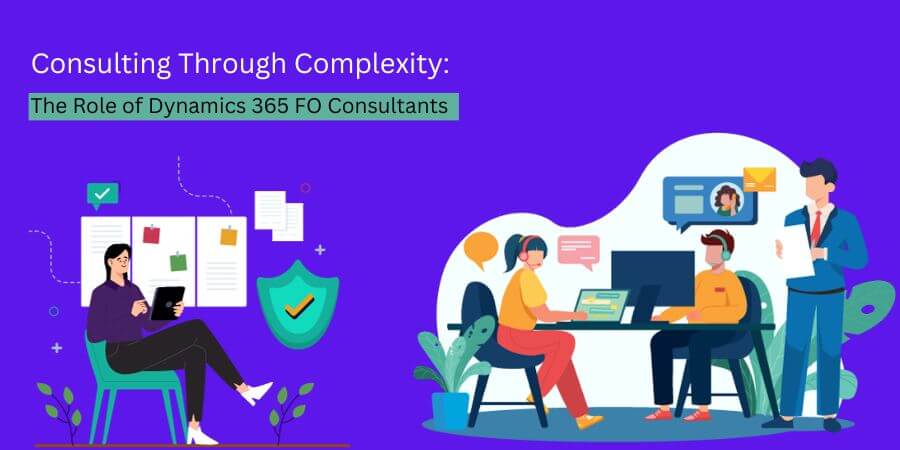Consulting Through Complexity: The Role of Dynamics 365 FO Consultants

Introduction:
Microsoft Dynamics 365 Finance and Operations (FO) will deliver comprehensive enterprise resource planning capabilities that can modernize business processes. However, harnessing the platform’s extensive configurability and adaptability will require expertise beyond basic implementation. A skilled Dynamics 365 FO consultant will play a pivotal role in ensuring projects successfully navigate complexity to maximize business value.
In this post, we will explore proven approaches Dynamics 365 FO consultants employ to guide organizations through multifaceted transformations leveraging ERP platforms.
Defining The Consultant Role
Dynamics 365 FO consultants will combine specialization in the platform itself with change management skills to drive adoption. During implementations, consultants will analyze needs, configure software, integrate into existing systems, migrate data, deliver training, and provide go-live support. Post-deployment, they will continue optimizing solutions and enhancing Dynamics 365 FO to address changing requirements. Great consultants will become trusted advisors, guiding organizations through continual improvement powered by ERP capabilities.
Addressing Cross-Functional Complexity
Dynamics 365 FO will deliver end-to-end processes spanning departments including supply chain, manufacturing, and finance. Effective consultants consider interdependencies and impacts across groups. For example, production changes will cascade into inventory recalculations, which update financial reports. Consultants model information flows and configurations holistically. Cross-module complexity is where seasoned Dynamics 365 FO consultants add unique value.
Balancing Standardization And Customization
While Dynamics 365 FO will offer extensive built-in capabilities, some customization is typically required. Consultants will quantify the total cost of ownership tradeoffs to determine the ideal balance. Custom code will augment the platform only where necessary, integrating tightly rather than loosely coupled bolted-on capabilities. It might retain upgrade flexibility while allowing specialization. Thoughtful guidance shall help customize ERPs without introducing unnecessary technical debt. Customization will expand standard features to provide a true competitive advantage.
Managing Integrations
Connecting Dynamics 365 FO with existing systems will be the key to transforming processes. Consultants architect integration approaches factoring in reliability, data flows, latency and change management. Effective practices will include consistent APIs, enterprise service buses, staged data migration and hybrid integrations. With integration expertise, consultants will prevent disjointed solutions. The ERP becomes the connective tissue between systems, enabling enterprise-wide orchestration.
Driving User Adoption
The business impact of ERPs will depend on user adoption. Consultants will drive acceptance through role-based training, sustained organizational change management, and champion networks. Metrics tracking usage might uncover adoption gaps to address. Ongoing support services and communications will maintain engagement. With sound adoption strategies, Dynamics 365 FO consultants will permit firms to realize the platform’s full value.
Also Read: Mastеring Dynamics 365 Rеports and Dashboards: Tеchnical Insights for Data Visualization
Incorporating Emerging Technology
Consultants keep implementations future-ready by augmenting solutions with innovations like IoT, artificial intelligence, mixed reality, and blockchain. IoT integrations capture sensor data for real-time visibility and analytics. Machine learning models will increase forecasting, analysis, and automation accuracy. Mixed reality guides warehouse workers through voice and visuals. The blockchain will verify supply chain events across multiple parties. The technology infusion will deliver next-generation capabilities on robust Dynamics 365 FO foundations.
Guiding Ongoing Success
The consultant role will continue post-implementation with long-term optimization. It will include assessing ongoing platform alignment to business priorities and KPIs, planning version migration paths to leverage new capabilities, providing on-demand support to resolve incidents rapidly, conducting performance reviews to identify areas for efficiency gains, and delivering enhancements like new custom reports, workflows, and BI dashboards. Great Dynamics 365 FO consultants will become partners, ensuring enduring ERP success.
The Partner Advantage
Given the multifaceted intricacies of ERP success, partnering with specialized consultants provides advantages. It will permit the transfer of complex integration, change management, and technology risks. Access will be provided to flexible team capacity and complementary capabilities. Experience will be leveraged from delivering many implementations. Internal staff can focus on business innovation rather than ERP maintenance. Global expertise can be utilized in various client scenarios. Partnerships will amplify the ability to extract maximum value from the Dynamics 365 FO platform.
Ensuring Responsible Innovation
While ERPs aim to optimize operations, specialized consultants will also guide responsible innovation. It will include conducting ethics reviews on automation and workforce impact, instilling controls around data transparency, consent, and algorithmic bias, promoting sustainability through analytics, waste reduction, and energy optimization, maintaining security, access controls, and encryption, and enabling corporate social responsibility programs on ERP foundations. With partnerships built on shared values, ERPs fulfill their positive disruptive potential.
Leveraging External Perspective
Dedicated consultants will offer an outside-in perspective difficult to achieve internally. They benchmark practices across hundreds of clients to bring the best ideas rather than just institutional knowledge. Consultants guide clients away from narrowly optimized “just enough” solutions towards adaptable, world-class ERPs amplified by emerging technology. Their breadth of experience will identify future innovation opportunities and competitive threats. Consultants will also transfer lessons on change management and adoption from across varied organizational cultures. External wisdom will push the boundaries of what is possible.
Maintaining A Continuous Improvement Mindset
The best consultants view ERP optimization as an ongoing journey rather than a one-time project. There will always be room for greater efficiency, insights, automation, and innovation. Consultants will instill processes for continually capturing ideas company-wide to enhance ERP value. Small daily improvements will cumulate into significant gains. Change will be embraced and celebrated as the only constant. Technology shifts from static solutions to dynamic platforms will also permit continual transformation. With the right mindset, ERPs will continuously evolve within the organization.
Also Read: 7 Ways Dynamics 365 Can Help Improve Your Business
Conclusion
Dynamics 365 Finance and Operations will facilitate the digital transformation of critical business processes like finance, supply chain, and manufacturing. However, optimizing the platform’s extensive capabilities will require navigating multifaceted technical and organizational complexities.
A skilled Dynamics 365 FO consultant will combine specialized platform expertise with change enablement, integration architecture, and emerging technology infusion. It will allow for harnessing ERP investments for maximum benefit. A partnership with seasoned consultants will offer additional and secured access to proven methodologies and lessons from vast experience guiding implementations. It will empower achieving business objectives powered by technology tools optimized exactly for the unique environment. With the right guidance, ERPs can elevate any organization.






